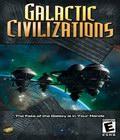Genre: Space Turn-Based Strategy
Publisher: Strategy First
Developer: Stardock
Release Date: Unknown
Galactic Civilizations is a game where you are the leader of the human race sometime in the 23rd century. Mankind has found out that there are other forms of life in the universe but not near as many as once thought. Only a select few have made contact with humanity, and although some are diplomatic and friendly, others are hostile and warlike. As the leader, it’s your job to increase the territory you control, subdue the other races, and gain supremacy in the galaxy.
The game is viewed from a top-down perspective similar to many other turn-based games. On the map are planets, stars, ships, and various artifacts that you can interact with. Moving ships is simply down by clicking the ship and right clicking where you want it to go, limited by its movement points per turn. Artifacts can be wormholes to random locations in the galaxy, ancient ships you can claim as yours, bits of technology that will upgrade the ship, or mere space junk.
There are many ships in the game, each suited towards exploring, combat, and colonization. To colonize planets or stars you load the ship up with people, fly it to an uninhabited planet, and land. Different planets have different levels of quality and resources, so it is best to colonize quickly before the AI players get to. Once you find a good planet and tell the colony ship to colonize the ship lands and turns into a small outpost on the planet. Once colonized, you can use planets to build ships and you can upgrade the planet by improving the soil, building entertainment centers, and developing trade goods.
Combat in the game is relatively simple. Each ship has a certain amount of HP, offense, and defense points. When attacking a ship, the attacker rolls a number between its maximum offense points and 0. The defending ship then rolls a number between its maximum defense points and 0. If the attackers’ number is larger than the defenders number that much damage is dealt. Then, the attacker becomes the defender and vice-versa, and the cycle repeats until one ship wins. A very simple system, but doesn’t allow for much room for tactics other than bringing the biggest ship you have to a conflict.
Trade in the game is a bit confusing. You don’t actually establish trade routes but rather freighters do that are independent of both the player and the AIs. These freighters tend to overlook planets unless they have a decent amount of value like trade goods. You gain profits off of taxation of these routes, and can shut them down if the route is bringing money to a race you dislike. However, it would be nice to be able to establish routes yourself, or at least pick what races you want to trade with.
This game graphically is nothing to show off to your neighbors but isn’t ugly by any regards. Ships are relatively detailed, the animations are fluid, and the colors are vibrant, but with the average computers of today a higher color depth would have been welcome. People coming into this game wanting eye-popping graphics should look elsewhere as the graphics look about six years old, but this game doesn’t advertise itself as such either.
Sound in the game is nearly non-existent, with only the occasional sound effect to play. Some form of background music would have been welcome, and more sound effects would be nice as well. Sadly, the audio end of the game is comparable to the graphically end, there’s nothing to entice any form of immersion or emotion, and those who like to have a lot of sound effects and music scores will be sorely disappointed.
In the current Beta version, many features have not been fully implemented but show promise. Ships can be set to autopilot to distant locations, using up its movement points and automatically heading towards the point without user intervention. This eliminates the need to baby-sit every ship to make them go places, which would get very old very quickly in games where you have more than a handful of ships. Also, you can assign governors to planets that will automatically build ships, upgrade the planet, and handle other micromanagement functions.
The AI in the game is its shining point. The AI calculates its moves in real time while you’re calculating yours, and thus there are no waits between turns. The AI is also fairly sophisticated. If you surround a planet with ships to attack it, the AI might surround your ships with stealth ships and launch a preventive attack. The AI also will establish relations with the other AIs; you may not want to attack a race that is allied with others unless you love lots of combat.
Galactic Civilizations is still in a Beta phase, so many of its shortcomings may be rectified before release. However, as it stands now only people who have interest in the older turn-based games will take notice. Galactic Civilizations will more than likely never enter mainstream gaming, but with a good amount of debugging and polish by the developers it may turn out to be a good game to please those with a love for turn-based strategy games and a little nostalgia in their hearts.
More articles about Galactic Civilizations




































